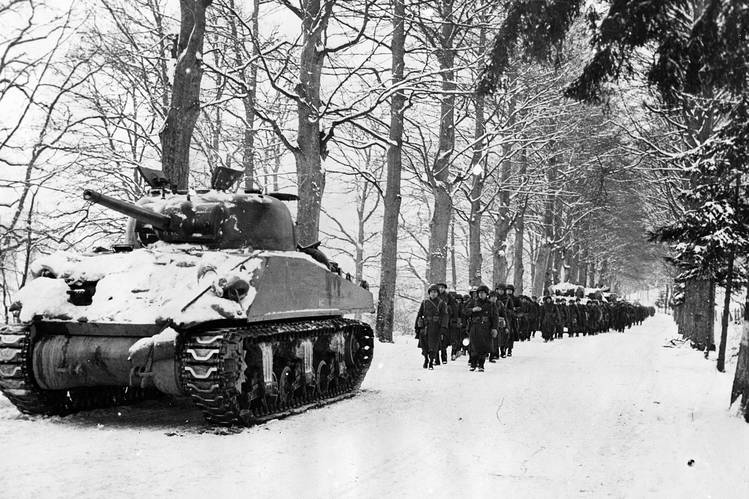- Homepage
- Uncategorized
- On Christmas Eve 1944, American and German Soldiers Came Together for a Temporary Truce In the Hürtgen Forest.H
On Christmas Eve 1944, American and German Soldiers Came Together for a Temporary Truce In the Hürtgen Forest.H
It was the winter of 1944, and the Hürtgen Forest on the German-Belgian border was a place of unrelenting misery. The dense pine trees blocked sunlight, the ground was frozen, and snow muffled every footstep — except for the sharp crack of gunfire and the distant thud of artillery. The Battle of Hürtgen Forest had already become one of the longest and most grueling fights of the Second World War, dragging on for months with heavy casualties on both sides. For the soldiers caught in it, Christmas Eve offered no reason to expect anything other than more death.

But sometimes, in the midst of war’s cruelty, something unexpected happens.
In a small hunting cabin deep in the forest, a German mother named Elisabeth Vincken and her 12-year-old son, Fritz, were trying to make it through the cold night. Their home in Aachen had been bombed, and her husband — a soldier — had sent them here for safety. They had little food left, just a few potatoes, some bread, and a chicken for Christmas dinner. Outside, the war raged on.
As darkness fell on December 24th, a knock came at the door. When Fritz opened it, three armed men stood there — American soldiers. One was badly wounded. They were cold, hungry, and lost, separated from their unit during the fighting. Elisabeth did not speak English, but she understood enough to know they meant no harm. She ushered them in, helped the injured man onto a bed, and began preparing what little food she had.
Before long, there was another knock. This time, when Fritz opened the door, he found four German soldiers — also cold, hungry, and far from their unit. Elisabeth’s heart raced. If the Germans saw the Americans, they might shoot them on sight. If they realized she had been sheltering the enemy, she could be punished or even executed.

But Elisabeth did something extraordinary.
She stepped outside, blocking the doorway, and told the German soldiers in a firm voice: “Es ist Heiligabend. Hier wird nicht geschossen.” — It is Christmas Eve. There will be no shooting here. She explained that inside were also American soldiers, and that everyone would lay down their weapons if they wished to share her home that night. Remarkably, the Germans agreed.
The weapons were left outside, and the seven enemy soldiers entered the tiny cabin. The air was tense at first, with suspicious glances exchanged across the table. But the warmth of the fire, the smell of cooking chicken, and the soft sound of the wind outside began to work a quiet magic. One of the Germans, a former medical student, tended to the wounded American. Another produced a bottle of wine from his pack. Soon, conversation began — broken, halting, but human.
That night, they sat together as men, not enemies. They shared the food equally. They prayed together before eating. They spoke of families far away, of home, of what they missed most. The war, for a few hours, felt far away.

In the morning, the soldiers shook hands. The Germans gave the Americans directions back to their lines, avoiding patrols. The Americans offered the same courtesy. Then, with the snow crunching under their boots, they disappeared into the forest in opposite directions, knowing full well that they might face each other again in battle. But they had shared something that could never be erased.
The story of that night might have been lost to history, but Fritz Vincken — the boy who witnessed it — carried it in his heart for decades. Many years later, living in the United States, he told the tale to a reporter. In 1995, he was reunited with one of the American soldiers from that night, decades after the war had ended. They embraced like old friends, bound forever by a Christmas truce in the most unlikely of places.
The Hürtgen Forest truce was not an official ceasefire like the famous Christmas of 1914 on the Western Front. It was a private, fragile, deeply human decision made in a tiny cabin, in the middle of a war that otherwise showed no mercy. It reminds us that even in the darkest times, compassion and courage can find a way.
History often records battles, generals, and treaties. But sometimes, the moments that define us are the ones when people choose to see each other not as enemies, but as fellow human beings. On Christmas Eve 1944, in the frozen heart of the Hürtgen Forest, that choice was made — and it turned a night of war into a night of peace.




